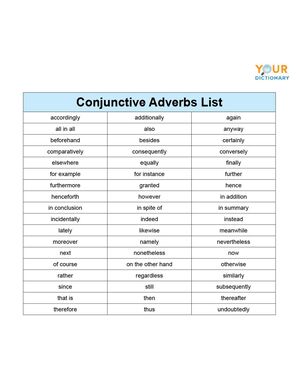

Conjunctive adverbs connect two independent clauses or complete sentences. They have a number of purposes, including showing contrast, sequencing events or ideas, demonstrating cause and effect, and summarizing a point. Keep reading for a list of conjunctive adverbs that are more common in everyday reading, and a few that can elevate your writing to a more sophisticated level.
Common Conjunctive Adverbs List
You can use conjunctive adverbs for several different purposes. "However" and "comparatively" are helpful ways to show the contrast between ideas, while "therefore" and "consequently" can demonstrate cause and effect. Check out a list of common conjunctive adverbs that you're likely to see in writing.
| again | all in all | also |
| anyway | besides | certainly |
| finally | for example | for instance |
| however | in addition | in conclusion |
| lately | meanwhile | next |
| otherwise | so | still |
| that is | then | yet |
Some of these words can be used as other parts of speech. However, they are considered conjunctive adverbs when used to link two independent clauses.
Sophisticated Conjunctive Adverbs List
Want to make your writing sound even more impressive while conveying the same concept? Use these eye-catching conjunctive adverbs the next time you're joining two ideas.
| accordingly | additionally | comparatively |
| consequently | conversely | equally |
| elsewhere | further | furthermore |
| incidentally | indeed | likewise |
| moreover | namely | nevertheless |
| nonetheless | rather | regardless |
| therefore | thus | undoubtedly |
Many conjunctive adverbs function well as transition words in a larger piece of writing. These adverbs help the reader understand where the current event or idea falls in context.
Examples of Conjunctive Adverbs in a Sentence
So how can you use a list of conjunctive adverbs to improve or vary your writing style? There are many ways to join two ideas with one word that modifies the sentence's meaning. Check out these example sentences to see how conjunctive adverbs join ideas.
- The workers are demanding better pay. Additionally, they want longer breaks.
- You must do your homework; otherwise, you might get a bad grade.
- I missed my interview. Consequently, I didn't get the job.
- Simon won't be attending the show; therefore, he has an extra ticket for anyone that can use it.
- The freshmen haven't finished their project. Comparatively, the seniors have been done for weeks.
- We broke up years ago. Still, I have feelings for Tony.
- Amy practiced the piano; meanwhile, her brother went out with his friends.
- Cody can't afford a new car. Nonetheless, he bought a huge truck.
- My mom loves dogs. However, she is allergic to them.
- We watched the fireworks show at night. All in all, it was a great experience.
You probably noticed that conjunctive adverbs can come after the period of the first independent clause, or they can follow a semicolon that joins the two clauses. Either of these placements is grammatically correct. It simply depends on your writing style and how you are communicating your point.
Printable List of Conjunctive Adverbs
Take a look at a list of conjunctive adverbs in our handy, downloadable PDF. It's a great reference tool for those moments when you want to improve your writing.

Use the chart in your writing notebook or classroom. Consult it when you're looking for just the right way to join your two clauses or sentences.
Conjunctive Adverbs Join and Modify
Conjunctive adverbs function as both conjunctions (by joining ideas) and as adverbs (by modifying parts of the sentence). Indeed, they are some of the most helpful types of adverbs that you're likely to encounter. Learn more about adverbs by studying what adverbs modify. You can also find a list of adverbs that will strengthen your writing and help you communicate more clearly.